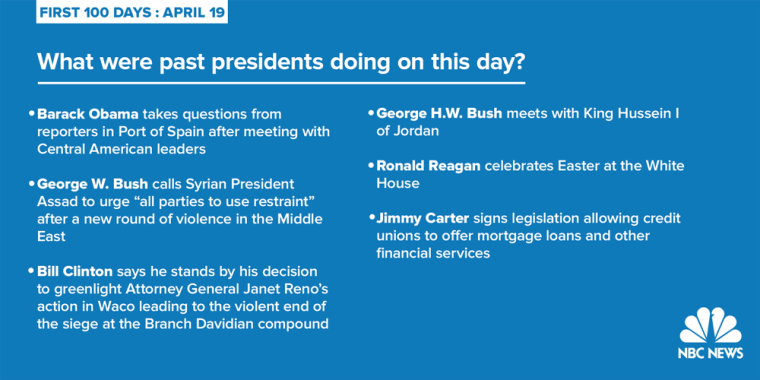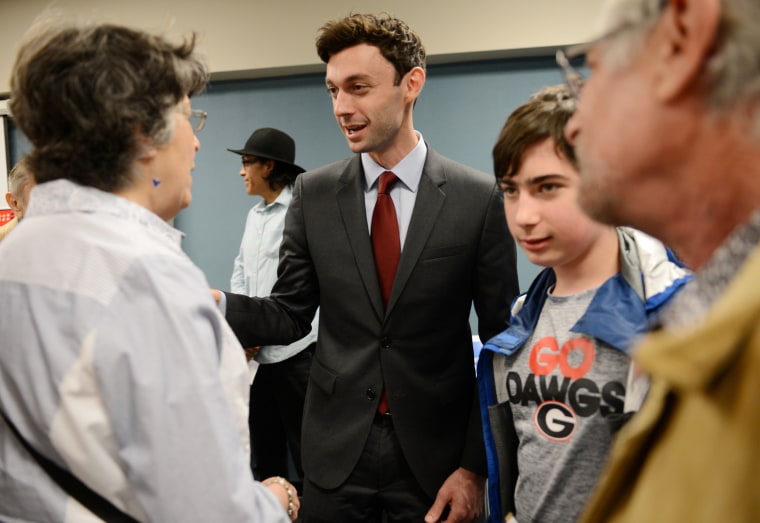First Read is your briefing from Meet the Press and the NBC Political Unit on the day's most important political stories and why they matter
Inside the numbers, Georgia election is still a boost for Dems
The headline from last night’s high-profile special congressional election in Georgia was that Democrat Jon Ossoff fell just short of the 50% needed to avoid a runoff, and he now faces a clash against Republican Karen Handel on June 20. But there’s arguably a much bigger story about last night: In the first two special congressional elections of the Trump Era, Democratic candidates are performing 10 to 20 points better than they did in 2016. Last night in Georgia, Ossoff grabbed 48% of the vote in the 18-candidate field — 10 points better than what the Democratic congressional candidate got against incumbent Republican Tom Price in the 2016 general election. And in Kansas last week, the Dem got 46% of the vote in that special election — 16 points higher than what another Dem nominee received in the district last November.
Now some important caveats here: In 2016, you had well-known and well-financed incumbents (Tom Price, Mike Pompeo) running against also-rans, so the recent special congressional elections were bound to be closer than what we saw last November. Even so, the Democratic candidates in the last two weeks outperformed Hillary Clinton’s 46.8% in GA-6 and 33% in KS-4, which all point to a big enthusiasm advantage Democrats enjoy right now. The question is: Can they sustain it — for the June 20runoff in Georgia, for the 2018 midterms, and even for the May 25 special in Montana (Republicans won that at-large district 56%-40% in 2016)?
- GA-6 in 2016: Tom Price 62%, Rodney Stooksbury 38%
- GA-6 in 2016 (presidential results): Trump 48%, Clinton 47%
- GA-6 in 2017 (initial round): Jon Ossoff 48%, Karen Handel 20%, Bob Gray 11%, Dan Moody 9%, Judson Hill 9%.
- KS-4 in 2016: Mike Pompeo 61%, Daniel Giroux 30%
- KS-4 in 2016 (presidential results): Trump 60%, Clinton 33%
- KS-4 in 2017: Ron Estes 53%, James Thompson 46%
- MT-AL in 2016: Ryan Zinke 56%, Denise Juneau 40%
- MT in 2016 (presidential results): Trump 57%, Clinton 36%
- MT-AL in 2017: ???
The Ossoff-Handel runoff will be VERY competitive
Looking ahead to the June 20 runoff in GA-6, it’s going to be very competitive. Just compare Ossoff’s percentage (48.1%) with the combined percentage of the Top 4 GOP candidates (48.2%). Or compare the total percentage for all Democrats (48.9%), versus the percentage for all 11 Republicans in the field (51%). Still, with Ossoff getting 48% last night, you might give him the very slight edge heading into the runoff. And so Democrats need a win here; anything less will be a disappointment for them. Also, the race will be a good early test of what is worse — President Trump or House Minority Leader Nancy Pelosi? Because Georgians are going to see a lot of TV ads in the next two months tying the nominees to both of these national politicians.
GA-6 results further America’s urban-vs.-rural political realignment
Looking at the BIG PICTURE of last night’s special congressional election in Georgia, you could make a good case that the results furthered America’s urban-vs.-rural political realignment. After all, GA-6 has come a long way from Newt Gingrich’s congressional district to the place where Jon Ossoff got 48% of the vote last night. And it’s a reminder that battle for control of the U.S. House in 2018 will likely take place in the American Sun Belt, where Democrats have a better chance of winning urban/suburban districts.
Did Trump help or hurt Republicans last night?
As for President Trump and his role in last night’s Georgia election, he tweeted last night (at 12:09 am ET!!!), “Despite major outside money, FAKE media support and eleven Republican candidates, BIG "R" win with runoff in Georgia. Glad to be of help!” You can make the argument that Trump’s GOTV tweets over the last 48 hours helped boost Republican turnout to keep Ossoff below 48%. But you could also argue that Trump’s intervention helped Ossoff beat expectations. (How many really thought he’d get that close to 50%?)
But here is one undeniable truth about last night: The GOP candidates who tied themselves to Trump did NOT do well. “Bob Gray made allegiance to Donald Trump the cornerstone of his campaign, and he may have suffered for it. He got about 10 percent of the vote and came under a barrage of criticism over his pro-Trump bona fides,” the Atlanta Journal-Constitution writes. “And Bruce LeVell, head of Trump’s diversity coalition, got less than 1 percent of the vote. He also put Trump at the center of his campaign, and even made a last-minute trek to the White House to visit with the president, who didn’t endorse any candidate in the race.” By the way, Handel tweeted this morning that Trump called her to congratulate her for making the runoff, per NBC’s Kasie Hunt.
Despite rhetoric, is Team Trump pretty much following Obama’s foreign-policy playbook?
The other big political news of the day: The Trump administration certified that Iran is complying with the nuclear deal, NBC’s Andrea Mitchell reported on “Today” this morning, though Secretary of State Rex Tillerson said the administration is weighing whether to break the deal. The Trump administration admitting that Iran is complying with the nuclear deal -- despite so much GOP rhetoric to the contrary — is another reminder that, besides its rhetoric and firing off some cruise missiles in Syria, the Team Trump is still pretty much following the Obama playbook, at least when it comes to actions.
Just asking
A year ago, who thought Donald Trump would be president, and Bill O’Reilly and Roger Ailes out at FOX?
Trump’s Day
At 11:30 am ET, President Trump signs the Veterans Choice Program Extension Improvement Act, and he welcomes the New England Patriots to the White House at 2:30 pm ET.
What were other presidents doing on April 19?




